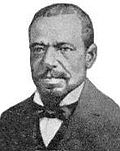1893 | |||||||||||
Presidential election | |||||||||||
| |||||||||||
| |||||||||||
 |
|---|
General elections were held in Liberia in 1893. In the presidential election, incumbent Joseph James Cheeseman of the True Whig Party was re-elected for a second term, [1] defeating Anthony D. Williams Jr., who ran on the New Republican Party ticket. [2]

